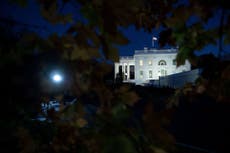Coronavirus: ‘No magic number’ to calculate Christmas risk, says scientist
Ministers expect to announce rules for festive period next week, says health secretary
Your support helps us to tell the story
From reproductive rights to climate change to Big Tech, The Independent is on the ground when the story is developing. Whether it's investigating the financials of Elon Musk's pro-Trump PAC or producing our latest documentary, 'The A Word', which shines a light on the American women fighting for reproductive rights, we know how important it is to parse out the facts from the messaging.
At such a critical moment in US history, we need reporters on the ground. Your donation allows us to keep sending journalists to speak to both sides of the story.
The Independent is trusted by Americans across the entire political spectrum. And unlike many other quality news outlets, we choose not to lock Americans out of our reporting and analysis with paywalls. We believe quality journalism should be available to everyone, paid for by those who can afford it.
Your support makes all the difference.Relaxation of coronavirus restrictions at Christmas will inevitably risk driving up infections, and there are “no magic numbers” for predicting the scale of the impact, government scientists have warned.
Health secretary Matt Hancock confirmed that ministers are working with devolved administrations on new UK-wide rules to allow people to see their loved ones safely.
But he told a Downing Street press conference that no decisions have yet been made and an announcement is not expected until next week.
“We are going to take an approach that keeps people safe as well as recognising the importance of Christmas and the importance of seeing our loved ones over Christmas,” he said.
NHS England medical director Stephen Powis said he had no doubt that the country will not be able to go “back to normal” after the current lockdown restrictions expire on 2 December.
And deputy chief medical officer Jonathan Van Tam said that it would be vital for families to obey social distancing rules during the festive break, in the hope of keeping back any resurgence in the virus.
Prof Van Tam played down suggestions from Public Health England that every day of relaxed controls would require five days of tighter restrictions later.
“The government clearly wants to give us a break, to some extent, at Christmas. We as citizens all want something of a break.
“But there are no magic numbers about one day of Christmas (equals) n days of payback in terms of lockdown.
“It's partly about the proportionate measures that the government will take in allowing us to have a sensible Christmas.
“But it's also about whether we comply, and whether we follow the rules that are then put in place for that period. And if people don't, then the first scientific principle is that things will go back up again.
“That's really, I think, the key message. There's a dual responsibility here and there's no magic number about how many days this is going to cost us, so we shouldn't frame it that way.”
Mr Hancock said that he wanted to delay any announcement on arrangements for Christmas until ministers had a package which all four nations of the UK could sign up to, because of the number of families likely to want to travel between England, Scotland, Wales and Northern Ireland to be with loved ones.
He said it would be “such a boost to the whole of the UK” if the four nations could come together and agree “a set of arrangements which are both safe and careful and sensible but allow families to see each other at Christmas”.
Mr Hancock said that he was personally planning “a small family Christmas, maybe with my father-in-law who lives on his own”. This would be allowed under existing rules, because Mr Hancock’s father-in-law is in their family’s support bubble, he explained.
“I know how important it is for people that we have a system in place, a set of rules that both keeps people safe but also allows people see their loved ones,” said the health secretary.
“And many people have family in different parts of the UK so we're working with the UK Government and the three devolved administrations to try to have a consistent set of rules across all four nations, so that it's easier for people to travel and to see their loved ones, but there will have to be rules in place, because we still want, obviously, to keep people safe as well."
The second lockdown imposed across England on 5 November will automatically lapse on 2 December, and Mr Hancock confirmed that government proposals for a system to replace it will be announced next week for debate by MPs.
Boris Johnson has already said he wants to return to a regional system of tiered restrictions, calibrated to local circumstances, but it is not yet clear whether these will be tougher than the rules in place before the lockdown.
Prof Powis said it was clear that there could be no “return to normal” next month, because of the need to avoid adding to pressure on the NHS as it enters the busy winter period.
"The government will be lifting the current restrictions on 2 December but I am sure we will not be going back to normal,” he said. “Further restrictions will be required.
“It’s important for us that we see numbers of admissions stay down. The public once again has responded this time round as it did in the spring. We want to ensure that we keep those gains and we keep the pressure off the NHS.
“But, as is quite right, the decisions as to which particular measures need to be in place needs to be a decision for our elected representatives based of course on the data analysis and what the figures are showing us."





Join our commenting forum
Join thought-provoking conversations, follow other Independent readers and see their replies
Comments